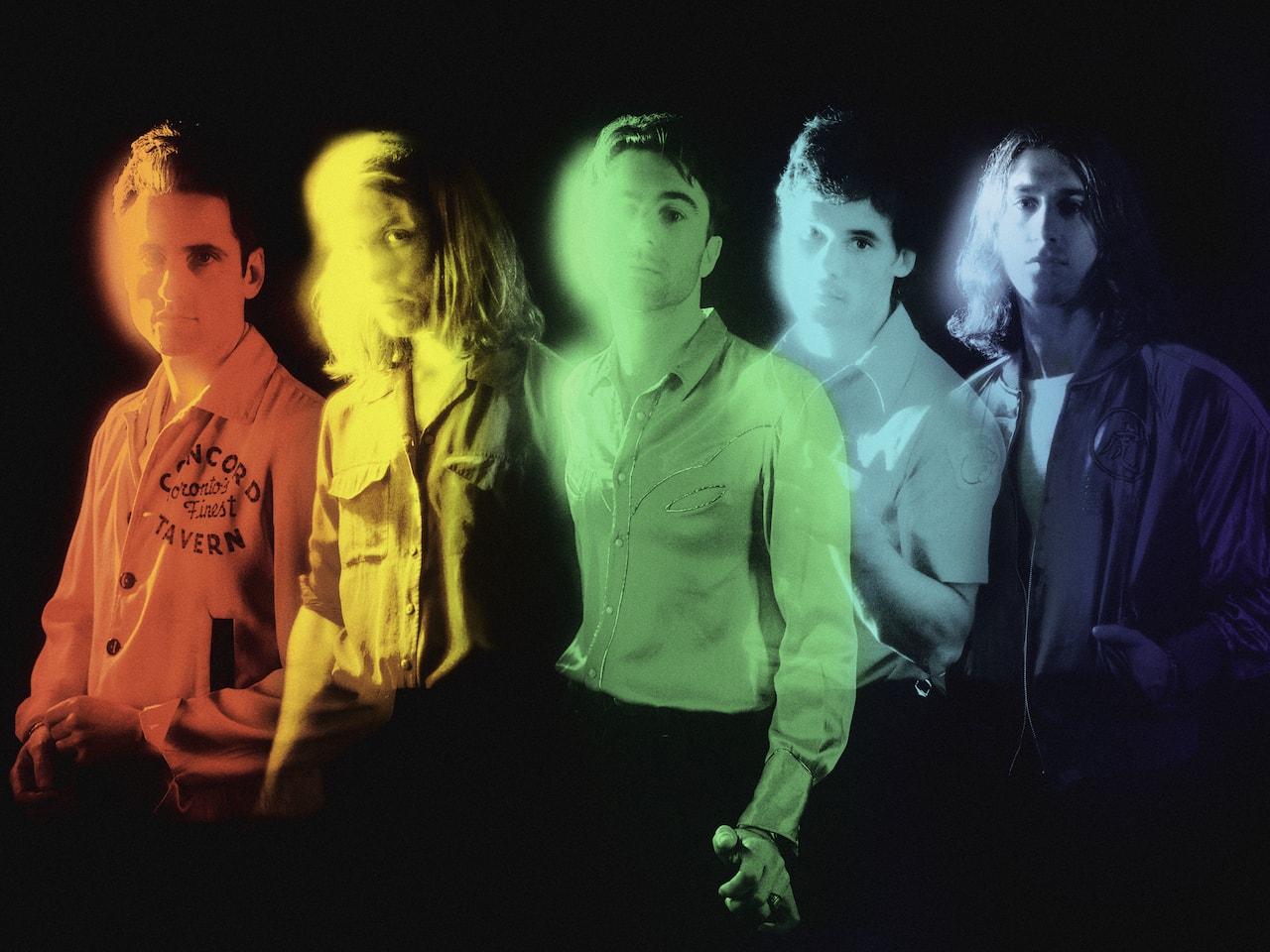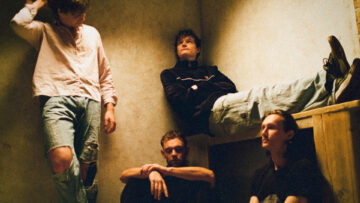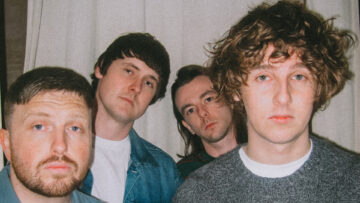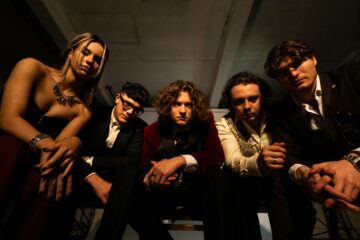
EXCLUSIVE: On the day of their first album release in nearly four years, whynow speaks to The Vaccines on the album they wish they never made, the notion of band identity, and being back in love city.

Back in Love City marks The Vaccines’ fifth album in just ten years. Yet, if frontman Justin Young could step back in time and undertake a catalogue do-over, things would be different. “Do you know what I would love to be able to do?” he declares candidly down the phone. “Go back over our discography and wipe out Come of Age. I’d have Combat Sports as our second record, English Graffiti as our third and Back in Love City as our fourth. To me, that makes more sense.”
The disregard for their second album might raise eyebrows – there’s more on that later – but the tinkering with the chronology is easier to comprehend. The West London outfit have found linearity to be something of a stranger when it comes to their creativity — their trajectory offering more of a hopscotch between progression and (minor) regression since their blistering debut, What Did You Expect from The Vaccines? landed in 2011. And so it comes to pass that rather than double-down on the retro stylings that shaped 2018’s Combat Sports, their latest album shares more of its DNA with the futuristic sonic palette that propelled their previous effort: 2015’s criminally underrated English Graffiti.
Back in Love City is a triumph; packed with the sort of effervescent day-glo indie anthems that drew audiences to The Vaccines in the first place
No matter which way you cut it, new album Back in Love City is a triumph; packed with the sort of effervescent day-glo indie anthems that drew audiences to The Vaccines in the first place whilst also stretching out into new terrain. The record’s narrative is rooted in the titular Love City: a half-dystopian-half-utopian metropolis where emotions are bought and sold. “I’m not saying we’re Radiohead, but we’ve always wanted to try and do something a little different every record, try and stay interesting and interested,” Young concedes, whilst baulking at the suggestion that Back in Love City could be perceived as their very first ‘concept album’ (“It wasn’t mapped out like some sort of prog opus from the 70s,” he pleads good-naturedly).
The loose concept did become a “guiding light” for the group during recording though, and this brought focus. “We started thinking about what sort of place [Love City] might be and what it might look like,” Young recalls. The band decamped to El Paso in Texas with producer Daniel Ledinsky and set to work. Songs cooked up in the studio would be discarded if they didn’t fit the world they were creating, while others were the “shoehorned” in. A couple of old songs felt right at home: Alone Star, which had been kicking around in various forms for some time slotted in; as did Jump Off The Top, which had been a fixture of their live set for a couple of years.
Lyrically, you’d be hard-pressed not to presume that the material was written through a lockdown lens—the album’s themes of tech-enabled connection and the commoditisation of emotions both echoing and satirising a period of our lives where we have leaned on technology to communicate beyond our walls. It was in the can by early 2020, however, and exists as a product of our pre-pandemic world.
Back in Love City is also The Vaccines second album following the departure of founding drummer Pete Robertson in 2016. When asked if this fallout remains the band’s nadir, Young agrees, and has insight as to why it happened. “He left for good reason,” he reflects. “You think of all the reasons why it might be fun to be in a band and I don’t think we were really making the most of any of those. We had got a little tired of each other and tired of the music.”
You think of all the reasons why it might be fun to be in a band and I don’t think we were really making the most of any of those
One memory haunts him still. In early 2016, Young would commute to Limehouse every day to work in bass player Arni Árnason’s “tiny shoebox of a studio” on what would eventually become Combat Sports. “One thing that always sticks in my mind is that there were four of us but there were only three places to sit,” he offers regretfully. “[And] there was no need for us to be doing that. We could have been working anywhere we wanted but we got into this unhealthy, depressing rhythm. It’s just that none of us were enjoying it. For Pete, that tipped over into not wanting to do it anymore.”
Pete’s spot was filled by erstwhile Spector drummer Yoann Intonti, and the band promoted touring keyboardist Timothy Lanham to fulltime member. As of 2021, the band is in a much happier place. “I think we’re a lot more patient with each other [now]. When you’re young and starting out you go through a lot of intense stuff together and, maybe through a lack of sleep, anxiety, and stress, you’re a lot harder on each other.”

Young also admits that his side project with Lanham, Halloweens, and the making of their 2020 album Morning Kiss at the Acropolis benefited his creativity. “Writing that record was quite cleansing. It brought focus to the more frenetic, unleashed side of my writing, which I think is what The Vaccines do really well and one of my strong points.”
It would take a cold, begrudging soul not to agree that The Vaccines have a startingly high hit rate when it comes to carving irresistible, up-tempo indie dancefloor fillers. “The longer that The Vaccines go on, the harder I find it to write upbeat songs,” Young confesses. “Nine times out of ten I feel as though we have written [the upbeat song] already and the last time it was slightly better. Therefore, the ones that get through I’m always excited about because it’s not always easy.”
English Graffiti, their third album, showcased a band in transition. It was a radical departure from the proto-six-string chug and spaghetti western arpeggios that filled What Did You Expect from The Vaccines? and 2012’s Come of Age. It marked a downturn in commercial success. “We were trying to find a way out,” says Young with hindsight.
“That was a scary thing to do because there was a reason why people fell in love with us, but we also didn’t want to make the same pop-rock record every eighteen months and coast. I don’t know if we were necessarily rewarded for that. I’m really proud of English Graffiti and there are moments there where I feel we were at our best.” It is at this point Young expresses his dream to excise their second album, Come of Age, from The Vaccines’ discography.

“I think that we recorded it too quickly,” he reflects. “I don’t think we had enough time to get together a body of work that was as strong as the first record. I also think that we were trying to expand on our sound, and potentially even our popularity, if I’m being honest. We stripped back some of the things that made The Vaccines The Vaccines. At the time, it was us trying to grow up and grow out of something that we thought to be quite limiting but, looking back, [those things were] more defining than limiting.”
As for the songs he would save from the Come of Age bonfire: “I love I Always Knew. I like No Hope, Aftershave Ocean and Lonely World. Parts of Weirdo I like. Don’t get me wrong, there are songs that I really like, but there are also songs I don’t feel are very good.” Which ones in particular? “I don’t think Possessive is a very good song. I’m not sure I Wish I Was a Girl is a great song. There are definitely songs that probably shouldn’t have made it onto the record. And that’s frustrating.”
[their] ability to articulate the ennui of modern living, along with their knack for arms-aloft, scissor-kicking guitar pop has long evidenced a special kind of alchemy.
Was this due to label pressure to swiftly follow up their hit debut? “Yeah, I think so. We were riding on the wave, and everyone was like, ‘we’re still a little way from the beach, we could keep going if you wanted?’ I guess that’s what happened.” The band’s four-album deal with Columbia ended with Combat Sports. AWAL, their new label, seems to have handed the band the keys to their future: “I feel very much like we’re in control of our own destiny now, which is great.”
The Vaccines’ ability to articulate the ennui of modern living, along with their knack for arms-aloft, scissor-kicking guitar pop has long evidenced a special kind of alchemy. It is not without reason that they were heralded by the British music press as the Saviours of Guitar Music when they burst onto the scene over a decade ago. There may have been some bumps along the road, rushed albums, departing members and more, but The Vaccines step into their second decade in fine fettle. Back in Love City is evidence of that.
“You’ve got to keep enjoying it and you have to think that you have a better record in you every time you finish one and start another,” warns Young.
With that in mind, what should we expect from The Vaccines by the time another ten years come around? “More than anything, I hope we’ll be ten albums in.” Here’s hoping.




